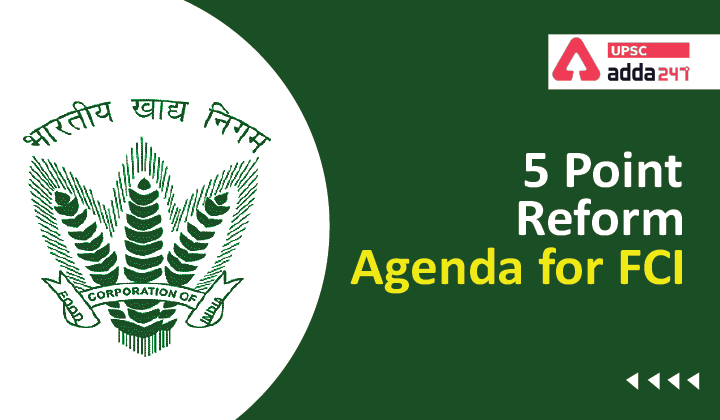Table of Contents
FCI Reforms: Relevance
- GS 2: Statutory, regulatory and various quasi-judicial bodies.
FCI Reforms: Context
- Recently, on the occasion of the 58th Foundation Day of Food Corporation of India (FCI), Minister for Consumer Affairs, Food and Public Distribution gave 5 Sutras to better FCI’s progress.
5 points reform agenda for FCI
- Change the public perception of FCI from being inefficient & corrupt to dynamic, inclusive & honest.
- Focus on integrating end-to-end tech solutions right from procurement to delivery to achieve operational efficiency & leakage free, distribution – reduce PDS response time, beneficiary tracking etc.
- Establish a grievance redressal mechanism to react rapidly to farmer/Farmer Producer Organisation in distress. Reaching out to farmers through “Jan Jagrukta” programmes at grass-root level to spread awareness.
- Plan for modern infrastructure & logistics. Upgrade warehouses to international standards. Improve storage capacity for the growing need- Power backup, CCTV, robust network facility.
- Global best practices to make India a ‘Food hub’.

About FCI
- The Food Corporation of India was setup under the Food Corporation’s Act 1964.
- Food policy objectives:
- Effective price support operations for safeguarding the interests of the farmers.
- Distribution of food grains throughout the country for public distribution system.
- Maintaining satisfactory level of operational and buffer stocks of food grains to ensure National Food Security.
- FCI’s Objectives:
- To provide farmers remunerative prices
- To make food grains available at reasonable prices, particularly to vulnerable section of the society
- To maintain buffer stocks as measure of Food Security
- To intervene in market for price stabilization
- Since its inception, FCI has played a significant role in India’s success in transforming the crisis management-oriented food security into a stable security system.
- FCI is the main central agency for execution of food policies of the government.
- FCI has come a long way in realizing the dream of India being a self-sufficient nation.
FCI report card
- FCI procures nearly 1,300 LMT of wheat & paddy annually against nearly 13 LMT procured during 1965.
- Similarly, distribution across the country has increased from about 18LMT in 1965 to nearly 600 LMT.
- Even the storage capacity from 6 LMT in 1965 has increased to over 800 LMT.
Also Read:




 TSPSC Group 1 Question Paper 2024, Downl...
TSPSC Group 1 Question Paper 2024, Downl...
 TSPSC Group 1 Answer key 2024 Out, Downl...
TSPSC Group 1 Answer key 2024 Out, Downl...
 UPSC Prelims 2024 Question Paper, Downlo...
UPSC Prelims 2024 Question Paper, Downlo...





